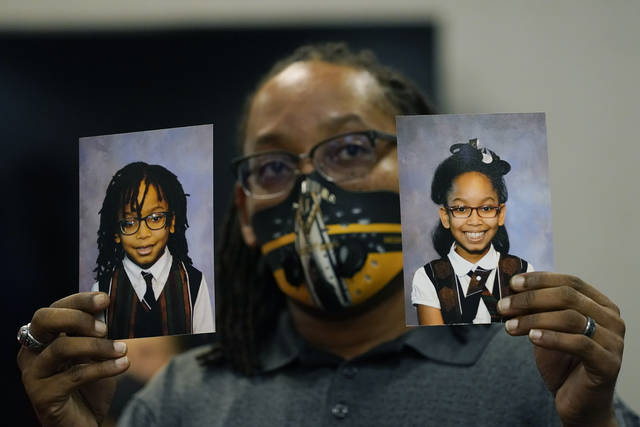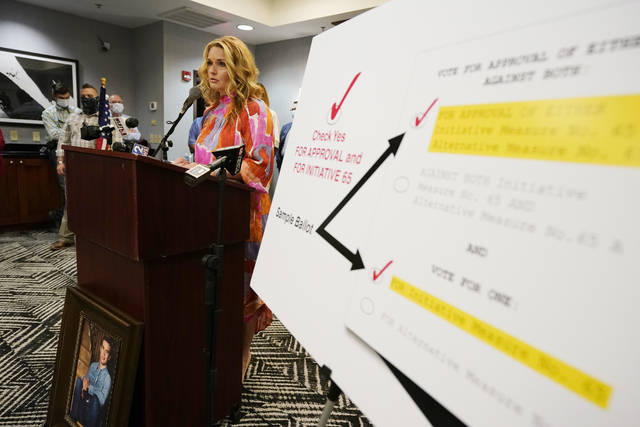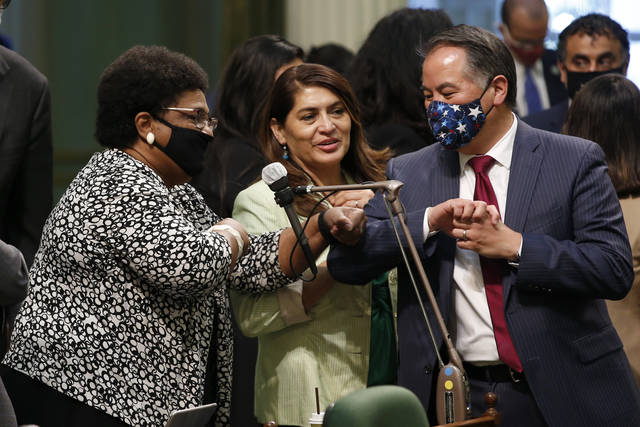The growing push to legalize marijuana was being put to another test Tuesday in both left- and right-leaning states as voters also decided a variety of state ballot measures affecting their own voting rights in future elections.
A total of 120 proposed state laws and constitutional amendments were on the ballot in 32 states. They touched on an array of issues that have roiled politics in recent years — abortion, racial inequalities, taxes and education, to name a few.
But none directly dealt with the dominant theme of 2020 — the coronavirus pandemic. That’s because the process to put measures on the ballot began, in most cases, before the virus surged to the forefront.
The Democratic-led New Jersey Legislature decided last December to place a measure on the ballot asking voters whether they should legalize marijuana for adults age 21 and older. Citizens’ initiatives led to recreational marijuana measures on ballots in Arizona, Montana and South Dakota. Medical marijuana initiatives also are being decided in Mississippi and South Dakota.
A decade ago, recreational marijuana was illegal in all 50 states. Voters allowed it in Colorado and Washington in 2012, sparking a movement that already included 11 states and Washington, D.C., heading into Tuesday’s elections. Supporters hope additional victories, especially in conservative states, could build pressure for Congress to legalize marijuana nationwide.
Voters in Oregon were considering whether to go even further. One proposal there would legalize the therapeutic use of psychedelic mushrooms. Another would make Oregon the first state to decriminalize possession of small amounts of street drugs such as cocaine, heroin and methamphetamine while also funding drug treatment efforts. The state Democratic Party endorsed the measure; the state Republican Party denounced it as “radical.”
More than a dozen proposals affecting future elections also were being decided.
Missouri voters were weighing whether to undo key parts of a nationally unique model they approved just two years ago that will employ a nonpartisan demographer to draw state House and Senate districts to achieve “partisan fairness” based on census results. Republicans who control the Legislature put forth a new ballot measure this year that would return redistricting duties to a pair of bipartisan commissions and drop “partisan fairness” to the end of the criteria.
Virginia voters were deciding whether to diminish the power of the Legislature, currently controlled by Democrats, to draw voting districts. A proposal would instead create a bipartisan panel of lawmakers and citizens to come up with a redistricting plan that the Legislature could approve or reject, but not amend.
Measures in Massachusetts, Florida and Alaska would change future elections by opening up primaries or instituting ranked-choice voting. Other measures in Arkansas, Florida and North Dakota ask voters to make it harder to enact future ballot measures.
Tax proposals were on the ballot in more than a dozen states, including higher property taxes on California businesses and higher income taxes on the wealthy in Illinois and Arizona. The additional tax revenue in Arizona would fund pay raises for teachers and other school personnel.
Among the many California ballot issues was one asking voters to repeal a 1996 initiative that prohibits affirmative action programs granting preferential treatment based on race, sex, color, ethnicity or national origin in public employment, education or contracting.
In Mississippi, voters were deciding whether to approve a new state flag with a magnolia design after legislators in June ended the use of a flag bearing a Confederate battle emblem. In Rhode Island, whose official name is “Rhode Island and Providence Plantations,” voters were deciding whether to eliminate the final three words, which some say evoke a legacy of slavery.
Anti-abortion measures were on the ballot in two states. A Louisiana measure would assert there is no state constitutional right to abortion — a move that could come into play if the U.S. Supreme Court overturns its Roe v. Wade decision that legalized abortion nationwide.
A Colorado measure would prohibit abortions after 22 weeks unless the pregnant woman’s life is endangered. Previous Colorado ballot initiatives to limit abortion failed in 2008, 2010 and 2014.















